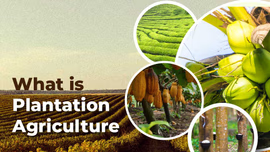
Table of Contents
Jowar Farming in India
Jowar is one of the prominent cereal crops in India. It is not only used as a staple food in the country but also as nutrient diet for the poorer section of the society. It is also used as an animal feed in the country. The cereal plant is coming up from east central Africa. Jowar or Sorghum belongs to the Graminae family. In India, jowar requires areas with less than 100 cm rainfall and temperature ranging from 26 °C to 33 °C for its growth. It is grown as a Rabi crop from the months of October to February and in some areas as a kharif crop. The soil requires for the cultivation is usually black cotton soil or regur soil, with clayey and alluvium properties. During the peak growth stage of the crop, it requires higher rainfall and crop maturity happens in cold weather conditions.
Jowar Producing States in India
Jowar is produced in many states in India. Let’s explore the top 10 jowar producing states of India below.
Maharashtra

The highest producer of Jowar in India is Maharashtra which accounts for around 31.12 lakh tonnes of the total production in 2022-23 with 888 kg per hectare yield in an area of 14.78 lakh hectare. This state cultivates almost 50% of the total area under Jowar cultivation. Bhakri is made as a flatbread in Maharashtra which is served with curries and non-vegetarian cuisines. Jowar is mostly cultivated in most of the district in Maharashtra, but Osmanabad, Nanded, Yavatmal, Buldhana, Kolhapur and Ahmednagar are major jowar producing districts.
Karnataka
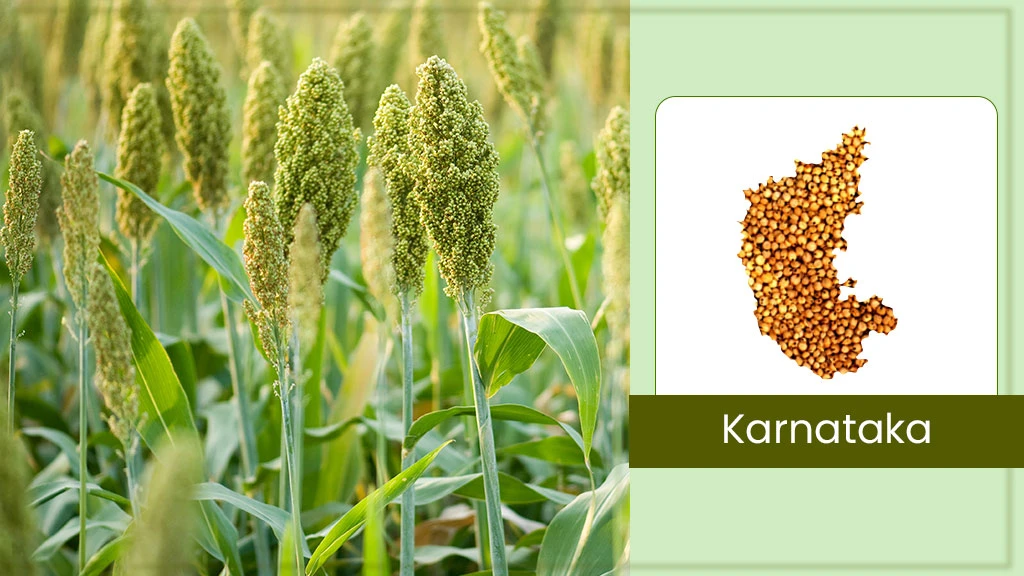
Karnataka ranks 2nd in the list of jowar producing states after Maharashtra. Jowar is the second most important crop in Karnataka after paddy. In 2022-23, Karnataka contributes 6.82 lakh tonnes in the production of jowar with yield of 1228 kg per hectare. Jowar is mainly grown in the north-eastern parts of Karnataka plateau. Dharwar, Bijapur, Raichur, and Belgaum are some districts with 80% jowar production in the state.
Rajasthan

Rajasthan is the largest in terms of area in India. It holds the 3rd position in terms of production of jowar which is 5.67 lakh tonnes, a yield of 890 kg per hectare by covering an area of 6.37 lakh hectares in the year 2022-23. Ajmer, Alwar, Banswara and Baran are some districts of Rajasthan where Jowar is commonly produced. Jowar flour is one of the specialities of Rajasthan. It is gluten free so people who are allergic to gluten can easily consume jowar roti and dishes made from jowar. Bhakri and Porridge are some famous dishes made from Jowar in the state.
Uttar Pradesh
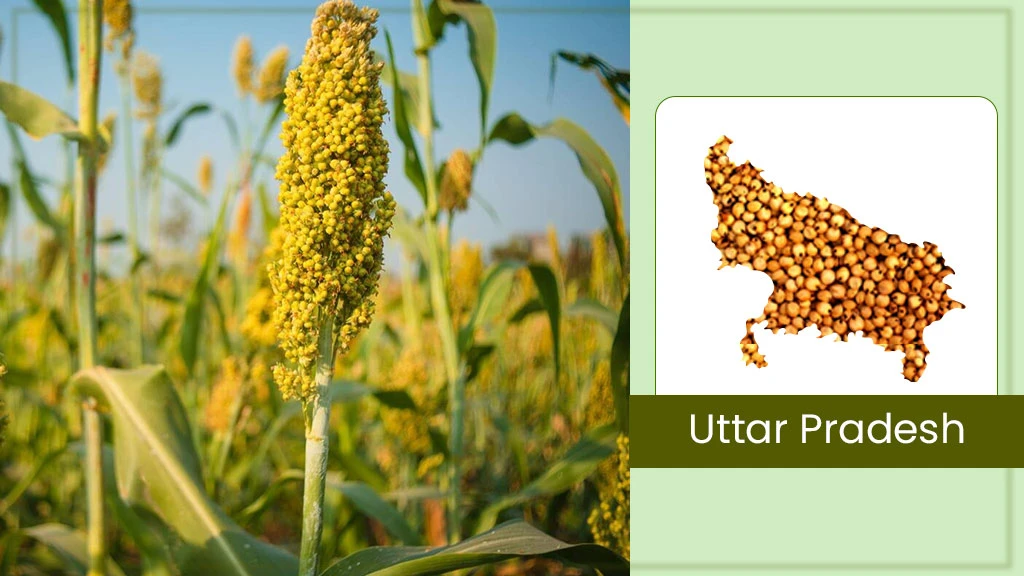
Uttar Pradesh which is the largest state in terms of population in India, ranks 4th in jowar producing states with a production of 3.15 lakh tonnes in 2022-23. The state covers an area of 1.98 lakh hectares with a yield of 1593 kg per hectare. Mathura, Agra and Firozabad are some famous jowar producing districts. Jowar Papad of Hamirpur is a popular snack.
Andhra Pradesh
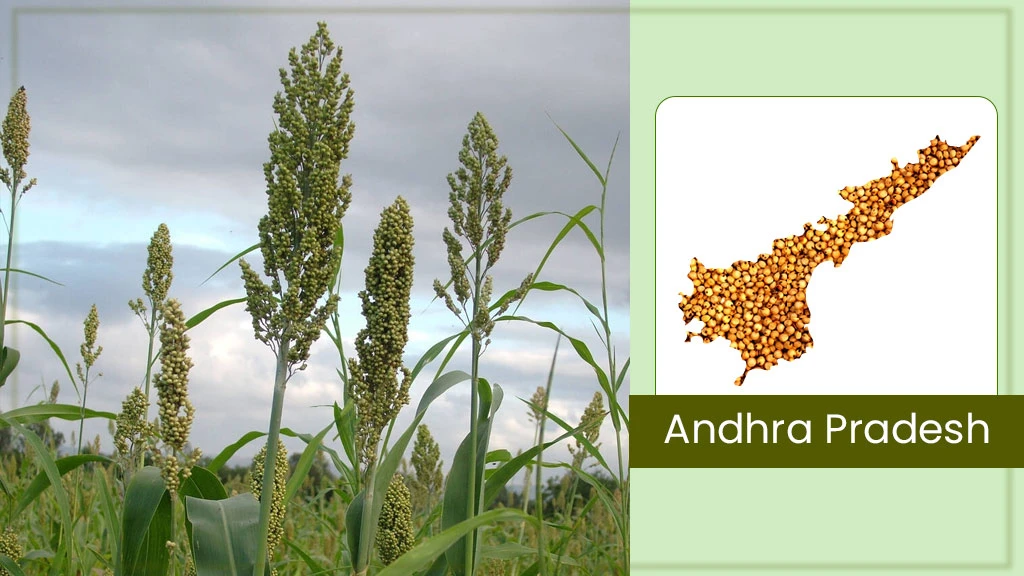
The popular south state of India, Andhra Pradesh holds the 5th rank in the list. This state is basically an agricultural economy. It contributes with a production of 2.84 lakh tonnes with a yield of 4054 kg per hectare and covers an area of 0.70 lakh hectare in 2022-23. Mahbubnagar, Khammam, Adilabad, Medak and Guntur are the major jowar producing districts of Andhra Pradesh. Bhakri, Cheela and Dosa are some popular food items made from jowar in the state.
Tamil Nadu
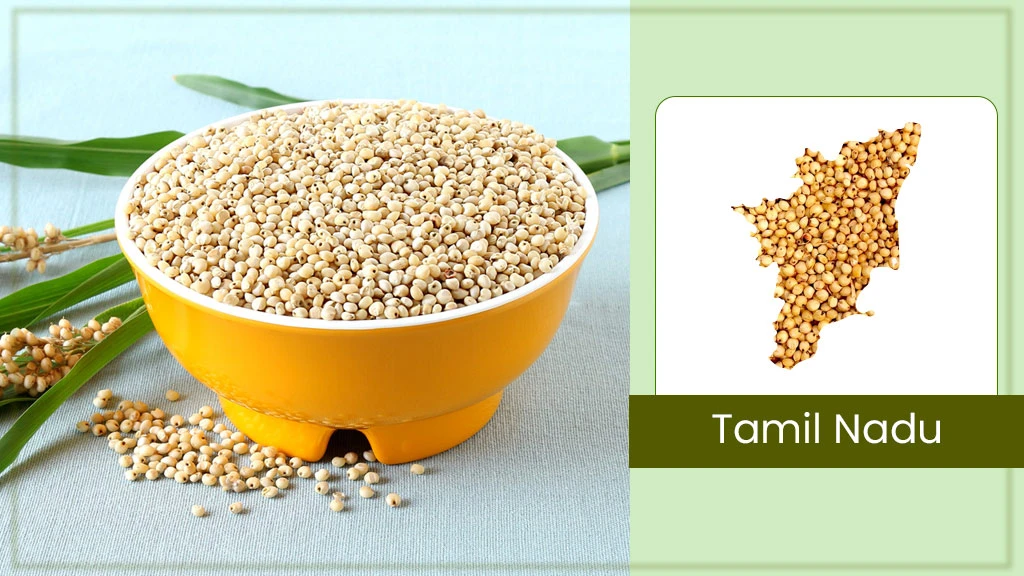
Now, we have Tamil Nadu in the list. In 2022-23, the production of jowar was 2.93 lakh tonnes with a yield of 813 kg per hectare and covers an area of 3.60 lakh hectare. Most of the production comes from the districts such as Coimbatore, Tiruchirapalli, Madurai and Dharmapuri.
Madhya Pradesh
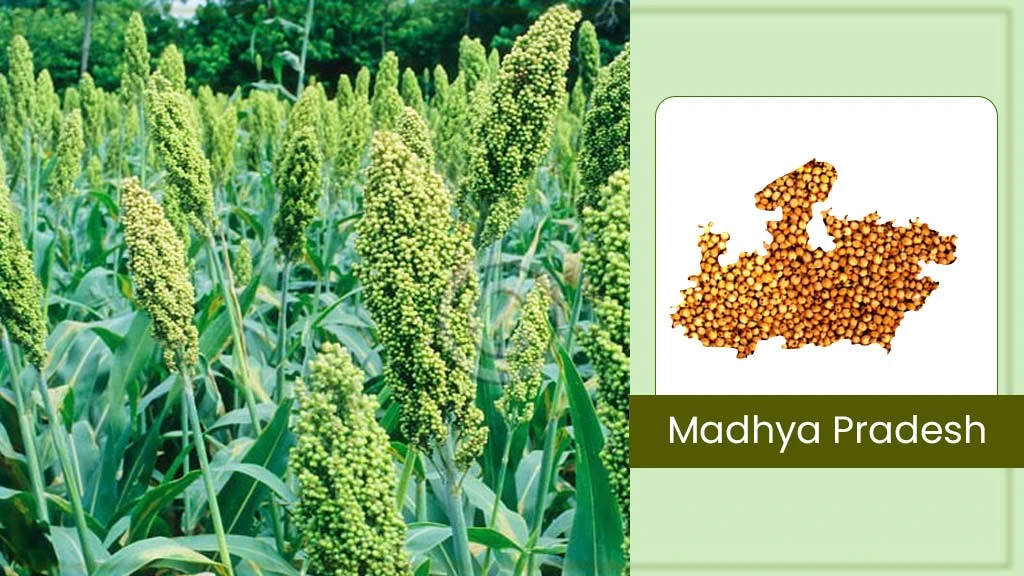
Madhya Pradesh is the central state of India which ranks 7th in the list and has the immense potential in agriculture which makes it remarkable in jowar production of 1.69 lakh tonnes and a yield of 1747 kg per hectare in 2022-23. The total area it covers is 0.97 lakh hectare. Ujjain, Devas and Shajapur are some popular jowar producing districts.
Telangana
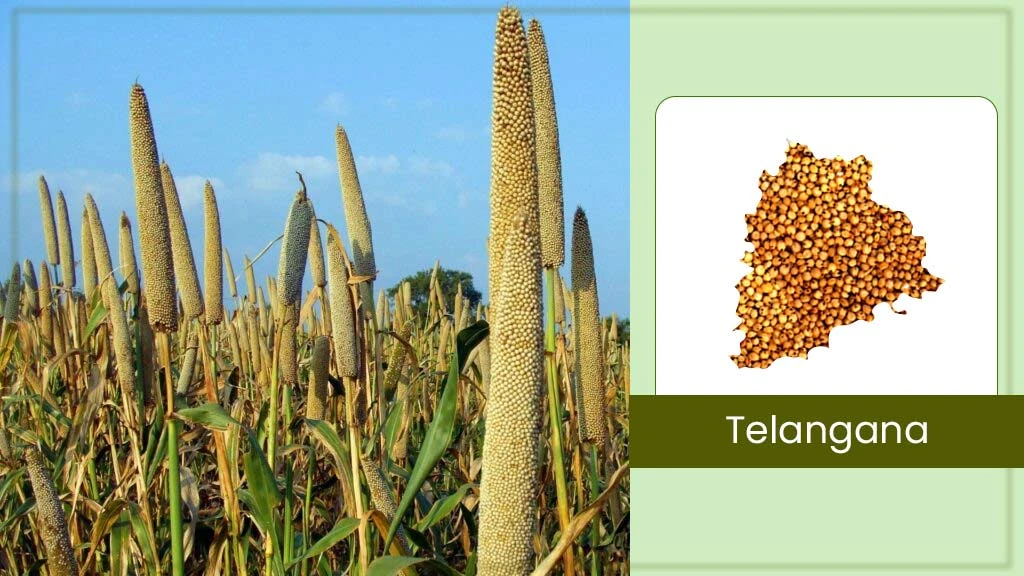
Telangana is a newly formed state of India and has a semi-arid hot and dry climate where crops need less water to grow which is suitable for the jowar cultivation. The state contributes to the overall 1.20 lakh tonnes production, covers an area of 0.68 lakh hectare with a yield of 1758 kg per hectare which makes it to stand on the 8th rank among top jowar producing states.
Gujarat
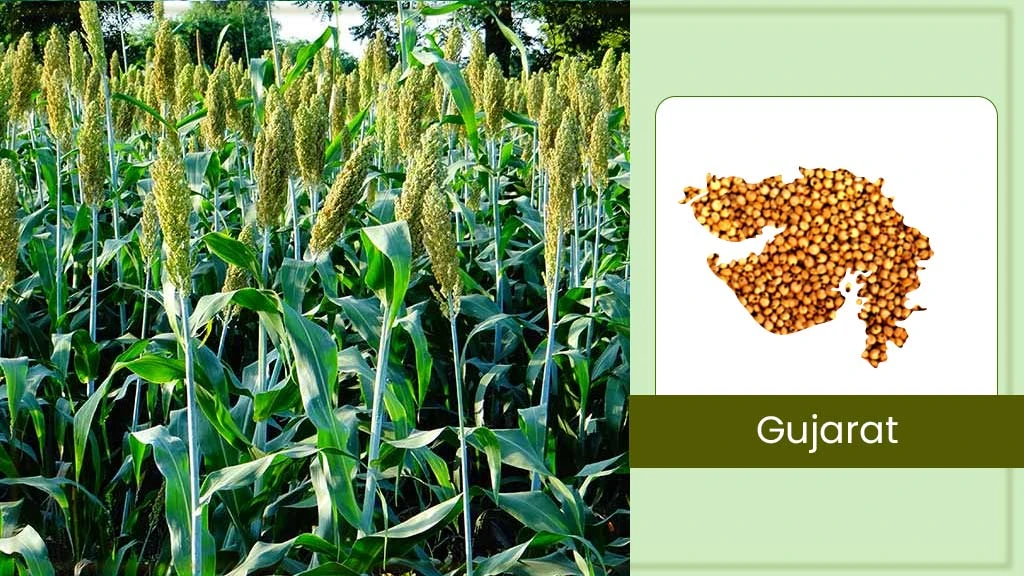
Now, we have Gujarat on the second last position among top jowar producing states in India by the overall contribution of 0.46 lakh tonnes and a yield of approximately 1460 kg per hectare covering an area of 0.32 lakh hectare in 2022-23. Most of the jowar cultivation is done in Surat and Tapi districts which has suitable climatic and soil conditions for the jowar cultivation.
Haryana
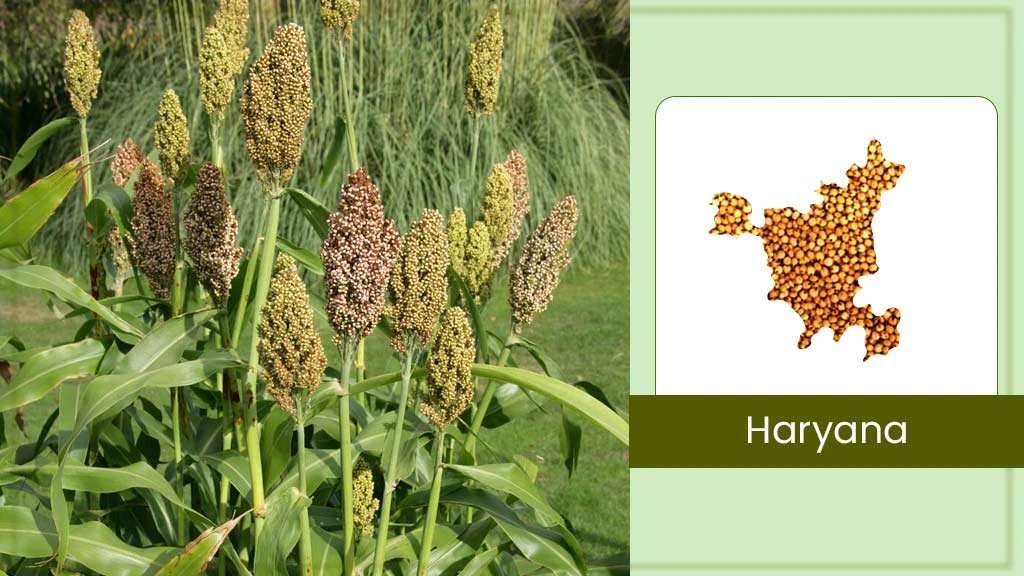
Last but not the least, we have Haryana in the list which gives an overall production of 0.14 lakh tonnes covering an area of 0.27 lakh hectare, with a yield of 526 kg per hectare in the year 2022-23. Haryana focuses on the sustainable agriculture and the promotion of climate resilient crops in the state. The south-western part of Haryana is suitable for the growth of jowar. Mahendragarh, Bhiwani, Hisar, Rohtak and Rewari are some districts where jowar is mostly produced in the states.
Scope of Jowar Farming in India
There’s a tremendous scope for the jowar farming in India as the country have seen a growth in recent years. Its use in different kinds of commercial purposes is making jowar an important agricultural product in the whole world. It is also used as a livestock feed and fodder. Some places also have facilities to produce alcohol from jowar. Sorghum has a sweet stalk, which can be used as raw material for jaggery, ethanol, paper making and some other industrial purposes. In India, jowar has been included as a commodity in the commodity market.
A new study by “Times of India” has uncovered Jowar as India’s resilient substitute for wheat. As Jowar is super adaptable and requires less water to grow and it has greater tolerance to temperature fluctuations as compared to wheat so, it is possible that jowar will acquire the position of many crops that results in the huge demand for the jowar farming in the country.
Frequently Asked Questions On Jowar Producing States in India 2026
1. Which state is largest producer of jowar in India?
Maharashtra is the largest producer of jowar in India.
2. Which soil is found suitable for growing jowar in India?
Black Cotton Soil is the best soil for growing jowar in India.
3. What is the best climate for jowar production?
Jowar requires areas with less than 100 cm rainfall and temperature ranging from 26° C to 33° C for its growth.


Related Blogs



